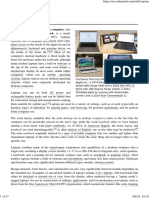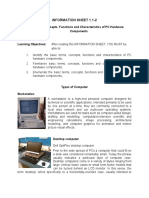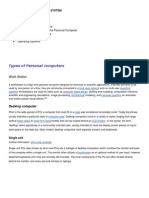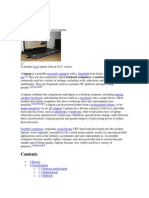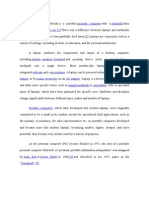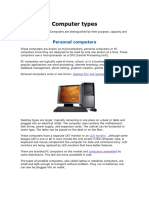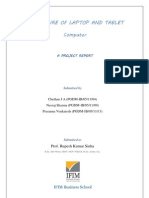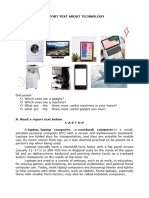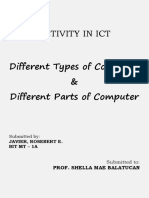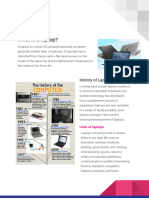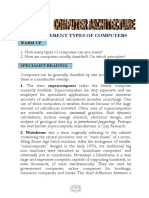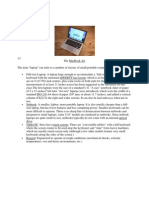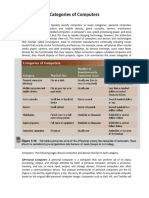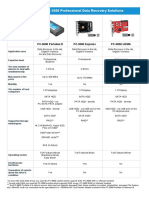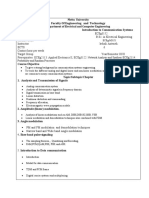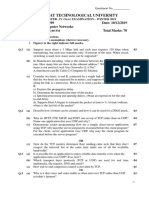Laptop History
Laptop History
Uploaded by
Eugene DomantayCopyright:
Available Formats
Laptop History
Laptop History
Uploaded by
Eugene DomantayOriginal Title
Copyright
Available Formats
Share this document
Did you find this document useful?
Is this content inappropriate?
Copyright:
Available Formats
Laptop History
Laptop History
Uploaded by
Eugene DomantayCopyright:
Available Formats
A laptop, laptop computer, or notebook computer is a small, portable personal computer (PC) with a
screen and alphanumeric keyboard. These typically have a clam shell form factor, typically having the
screen mounted on the inside of the upper lid and the keyboard on the inside of the lower lid, although
2-in-1 PCs with a detachable keyboard are often marketed as laptops or as having a laptop mode.
Laptops are folded shut for transportation, and thus are suitable for mobile use.[1] Its name comes from
lap, as it was deemed practical to be placed on a person's lap when being used. Today, laptops are used
in a variety of settings, such as at work, in education, for playing games, web browsing, for personal
multimedia, and general home computer use.
As of 2021, in American English, the terms laptop computer and notebook computer are used
interchangeably;[2] in other dialects of English one or the other may be preferred. The term 'notebook
computers' or 'notebooks' originally referred to a specific size of laptop (originally smaller and lighter
than mainstream laptops of the time),[3] the terms have come to mean the same thing and notebook no
longer refers to any specific size.
Laptops combine all the input/output components and capabilities of a desktop computer, including the
display screen, small speakers, a keyboard, data storage device, sometimes an optical disc drive,
pointing devices (such as a touch pad or pointing stick), with an operating system, a processor and
memory into a single unit. Most modern laptops feature integrated webcams and built-in microphones,
while many also have touchscreens. Laptops can be powered either from an internal battery or by an
external power supply from an AC adapter. Hardware specifications, such as the processor speed and
memory capacity, significantly vary between different types, models and price points.
Design elements, form factor and construction can also vary significantly between models depending on
the intended use. Examples of specialized models of laptops include rugged notebooks for use in
construction or military applications, as well as low production cost laptops such as those from the One
Laptop per Child (OLPC) organization, which incorporate features like solar charging and semi-flexible
components not found on most laptop computers. Portable computers, which later developed into
modern laptops, were originally considered to be a small niche market, mostly for specialized field
applications, such as in the military, for accountants, or traveling sales representatives. As portable
computers evolved into modern laptops, they became widely used for a variety of purposes.[4]
You might also like
- 10 Types of ComputersDocument9 pages10 Types of ComputersChandra Sekhar Reddy50% (2)
- 1.selective Repeat ARQ Protocol: (Author)Document9 pages1.selective Repeat ARQ Protocol: (Author)Natorious Gaming YTNo ratings yet
- Laptop AssignmentDocument1 pageLaptop Assignmentvkboss1301100% (1)
- A "Modern"-Day Laptop: LenovoDocument1 pageA "Modern"-Day Laptop: LenovoThariqNo ratings yet
- A Modern-Day Laptop: LenovoDocument1 pageA Modern-Day Laptop: LenovoPrasoon PurwarNo ratings yet
- Laptop - WikipediaDocument1 pageLaptop - Wikipediagetato6472No ratings yet
- Personal Computer Clamshell Keyboard LCD LED Computer Screen Mobile UseDocument1 pagePersonal Computer Clamshell Keyboard LCD LED Computer Screen Mobile UseRaaj RacyNo ratings yet
- Trabajo Ingles Conectivos Sufijos PrefijosDocument6 pagesTrabajo Ingles Conectivos Sufijos PrefijosIsaac V :vNo ratings yet
- LaptopDocument1 pageLaptopEdrea MendezNo ratings yet
- LaptopDocument154 pagesLaptopshubhamvpathade03No ratings yet
- Laptop - A Brief HistoryDocument28 pagesLaptop - A Brief Historybetil24684No ratings yet
- 2 Information Sheet 1.1-2Document13 pages2 Information Sheet 1.1-2jhon lurym delos santosNo ratings yet
- Andi Asfar (Text Report)Document2 pagesAndi Asfar (Text Report)Andi AsfarNo ratings yet
- Laptop in InglesDocument28 pagesLaptop in InglesKatherine Jimenez FalconesNo ratings yet
- Tugas Mandiri Bahasa InggrisDocument21 pagesTugas Mandiri Bahasa InggrisDedy BunNo ratings yet
- Documento LaptopDocument3 pagesDocumento Laptopjhon velascooNo ratings yet
- Experiment No - 1 (H&N)Document7 pagesExperiment No - 1 (H&N)Arsalan DafedarNo ratings yet
- Introduction To Computer SystemDocument10 pagesIntroduction To Computer SystemverdsNo ratings yet
- PROJECTpoojaDocument113 pagesPROJECTpoojaDhruvNo ratings yet
- Laptop: Citation NeededDocument26 pagesLaptop: Citation NeededAbraham Vasquez FaustinoNo ratings yet
- Personal Computer Clamshell Mobile UseDocument3 pagesPersonal Computer Clamshell Mobile UseBalaji GajendranNo ratings yet
- Classification of Digital ComputersDocument2 pagesClassification of Digital ComputersSreenath SukumaranNo ratings yet
- Computer TypesDocument25 pagesComputer TypesScribdTranslationsNo ratings yet
- Different Types of Computers and Their FunctionsDocument9 pagesDifferent Types of Computers and Their FunctionsJeral DeeNo ratings yet
- LAPTOPDocument2 pagesLAPTOPANIRUTH SNo ratings yet
- MIS Tablet Vs Laptop ProjectDocument18 pagesMIS Tablet Vs Laptop ProjectchetanjaNo ratings yet
- Classification of ComputerDocument4 pagesClassification of Computerbhatiaharryjassi100% (1)
- Personal Computer Clamshell Mobile Use: Citation NeededDocument1 pagePersonal Computer Clamshell Mobile Use: Citation NeededswathipalaniswamyNo ratings yet
- Computers Types: I, Computer: DefinitionDocument3 pagesComputers Types: I, Computer: DefinitionGRascia OnaNo ratings yet
- 1.1 INTRODUCTION: Tablet Personal ComputerDocument46 pages1.1 INTRODUCTION: Tablet Personal Computerakankshamishra150No ratings yet
- (SEPT 4, 2023 - SEPT. 8, 2023) WEEK 1 - Grade 7 Types of ComputerDocument20 pages(SEPT 4, 2023 - SEPT. 8, 2023) WEEK 1 - Grade 7 Types of ComputerJayjay TorresNo ratings yet
- BANGI, Joshua Celton M.-Formatting Exercise 2Document2 pagesBANGI, Joshua Celton M.-Formatting Exercise 2Joshua BangiNo ratings yet
- Refined IntroDocument42 pagesRefined Introbetusum19No ratings yet
- Categories of ComputersDocument9 pagesCategories of ComputersNtokozoNo ratings yet
- Report Text 123Document4 pagesReport Text 123Fadel Muhammad NaufalNo ratings yet
- Lecturer: Wamusi Robert Phone: 0787432609: UCU Arua Campus FS1102 Basic ComputingDocument62 pagesLecturer: Wamusi Robert Phone: 0787432609: UCU Arua Campus FS1102 Basic ComputingAyikoru EuniceNo ratings yet
- Parts of A Computer and Their FunctionsDocument16 pagesParts of A Computer and Their FunctionsElvie E. JavierNo ratings yet
- Bahasa Inggris Tugas KeduaDocument1 pageBahasa Inggris Tugas KeduaBaso khaerulNo ratings yet
- What Is PCDocument9 pagesWhat Is PCJaime CanchelaNo ratings yet
- English - Book - Unit 01 - Section - 02 - ColoredDocument5 pagesEnglish - Book - Unit 01 - Section - 02 - Coloredamirreza13831No ratings yet
- Handheld Computers: What Is A Handheld Computer?Document48 pagesHandheld Computers: What Is A Handheld Computer?Suraj ParhadNo ratings yet
- Types of ComputersDocument5 pagesTypes of ComputersRhea Tupan PradoNo ratings yet
- Computer Fundamental Assignment 1Document6 pagesComputer Fundamental Assignment 1Hassan ExonetteNo ratings yet
- Tablet PC: A. ArticleDocument1 pageTablet PC: A. ArticleUlfia RamadhiyahtiNo ratings yet
- English Project (Laptop)Document5 pagesEnglish Project (Laptop)Thanthar Khunn ThitNo ratings yet
- Module 3 ITDocument20 pagesModule 3 ITfokusNo ratings yet
- Types of ComputerDocument11 pagesTypes of Computerlaibaoffline990No ratings yet
- Laptop SpecificationsDocument8 pagesLaptop SpecificationsKaustubh VajarkarNo ratings yet
- Lesson 32ndGDocument7 pagesLesson 32ndGjustinejamesimportanteNo ratings yet
- LTP Final-1Document28 pagesLTP Final-1PrabhjotNo ratings yet
- Laptop - WikipediaDocument22 pagesLaptop - WikipediaglennNo ratings yet
- Software AplicationDocument2 pagesSoftware AplicationRajeshNo ratings yet
- Types of ComputerDocument9 pagesTypes of ComputerAkhilesh BhuraNo ratings yet
- Differnt Types of ComputersDocument7 pagesDiffernt Types of Computersjohn bourkeNo ratings yet
- Refined IntroDocument42 pagesRefined IntroRina Ignalig RamosoNo ratings yet
- Introduction To PCDocument31 pagesIntroduction To PCRonalyn SiaNo ratings yet
- Personal ComputerDocument3 pagesPersonal ComputerDan Mark IsidroNo ratings yet
- Intro To Computer LandscapeDocument24 pagesIntro To Computer LandscaperomeofatimaNo ratings yet
- Module in IT ERADocument9 pagesModule in IT ERASherlyn OlinoNo ratings yet
- 1.0 - 2.0 - Intro. To Computers, Intro. To Info. Tech Types of ComputersDocument2 pages1.0 - 2.0 - Intro. To Computers, Intro. To Info. Tech Types of ComputersMaurice FrancisNo ratings yet
- Exploring Computer Hardware - 2024 Edition: The Illustrated Guide to Understanding Computer Hardware, Components, Peripherals & NetworksFrom EverandExploring Computer Hardware - 2024 Edition: The Illustrated Guide to Understanding Computer Hardware, Components, Peripherals & NetworksNo ratings yet
- Etymology of BicycleDocument2 pagesEtymology of BicycleEugene DomantayNo ratings yet
- Sanay Wala Nang WakasDocument5 pagesSanay Wala Nang WakasEugene DomantayNo ratings yet
- BicycleDocument1 pageBicycleEugene DomantayNo ratings yet
- Basketball PurposeDocument1 pageBasketball PurposeEugene DomantayNo ratings yet
- Association FootballDocument1 pageAssociation FootballEugene DomantayNo ratings yet
- Lecture Note On ComputerDocument61 pagesLecture Note On ComputerwealthcrownjoyNo ratings yet
- The Difference Between PC-3000 SolutionsDocument1 pageThe Difference Between PC-3000 Solutionsdugi_74No ratings yet
- How To Configure VLAN and interVLAN Routing in Packet TracerDocument14 pagesHow To Configure VLAN and interVLAN Routing in Packet TracerZemicheal BerihuNo ratings yet
- Chap-1 CNDocument37 pagesChap-1 CNsavan sakhiyaNo ratings yet
- Airheads Edgeconnect CustomerDocument18 pagesAirheads Edgeconnect CustomerRochelle-Mari van rooyenNo ratings yet
- As-I 3.0 PROFIBUS-Gateways With Integrated Safety MonitorDocument24 pagesAs-I 3.0 PROFIBUS-Gateways With Integrated Safety Monitormulutsega woldeNo ratings yet
- Preliminary Specsheet DE3650Document2 pagesPreliminary Specsheet DE3650paulaNo ratings yet
- CMC TelecomDocument9 pagesCMC TelecomĐạt PhạmNo ratings yet
- Data Communication Lab Act 3Document4 pagesData Communication Lab Act 3ralphaurelio1No ratings yet
- Brkcol 2616Document50 pagesBrkcol 2616cool dude911No ratings yet
- MQTTDocument4 pagesMQTTsreeja sethuNo ratings yet
- CN Lab Manual (2018 19)Document59 pagesCN Lab Manual (2018 19)Rajshree BorkarNo ratings yet
- Marca Linea Tipo Modelo CaracteristicaDocument6 pagesMarca Linea Tipo Modelo CaracteristicaMonica BenavidesNo ratings yet
- NegrospisowifiDocument12 pagesNegrospisowifiNorma Dominga Peralta KoyocNo ratings yet
- Perform Mensuration and CalculationDocument36 pagesPerform Mensuration and CalculationJose BundalianNo ratings yet
- BHM-78 Microphone Report and Findings April 2021Document5 pagesBHM-78 Microphone Report and Findings April 2021Zolindo ZolindoNo ratings yet
- Real Time Transport ProtocolDocument30 pagesReal Time Transport ProtocolAlfred MasekwamengNo ratings yet
- Ecuring Wildfly Apps With Openid Connect: Ildfly ElytronDocument1 pageEcuring Wildfly Apps With Openid Connect: Ildfly Elytronhisyam darwisNo ratings yet
- Course Introduction To Communication Systems.Document4 pagesCourse Introduction To Communication Systems.Sha Tu BolaNo ratings yet
- Hts 5600Document100 pagesHts 5600sarath chandranNo ratings yet
- A Contemporary Survey On Free Space Optical Communication: Potential, Technical Challenges, Recent Advances and Research DirectionDocument59 pagesA Contemporary Survey On Free Space Optical Communication: Potential, Technical Challenges, Recent Advances and Research DirectionDarshan GowdaNo ratings yet
- IVIEW ManualDocument24 pagesIVIEW ManualThaddeus KosciuszkoNo ratings yet
- ATEIS DIVA 2016 Ver 5Document39 pagesATEIS DIVA 2016 Ver 5bhasker sharmaNo ratings yet
- W2019-2140709-APY MAterialDocument2 pagesW2019-2140709-APY MAterialMeet PatelNo ratings yet
- Ugs SopDocument8 pagesUgs SopMerine MathewNo ratings yet
- User Reference Guide SD260 - SD360 - SD460Document32 pagesUser Reference Guide SD260 - SD360 - SD460mikejonesNo ratings yet
- SPREAD SPECTRUM AND MULTIPLE ACCESS LPDocument19 pagesSPREAD SPECTRUM AND MULTIPLE ACCESS LPpapayee lakshmananNo ratings yet
- Wearesocial - Digital Vietnam 2018Document60 pagesWearesocial - Digital Vietnam 2018188.4No ratings yet
- Advanced Car Eye 30Document15 pagesAdvanced Car Eye 30andreiNo ratings yet





